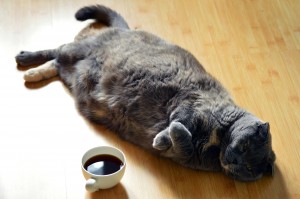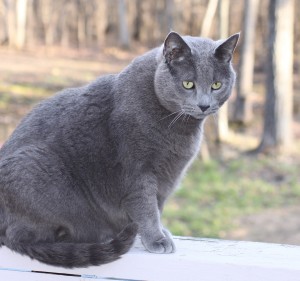by Soojin Um
Staff Writer
It’s a little perplexing, but the idea of the fat cat being the ideal cat has been around for a long time. Fat cats are funny, they’re cute, and they even have a world famous comic book character to represent them in popular culture. However, being a fat cat is not exactly what it’s cracked up to be. Obesity can affect their health and wellbeing, and it can diminish their quality of life. It’s important to keep your furry felines at an optimal weight. Let’s find out how we can do that.
 How to tell
How to tell
Veterinarians say cats are obese if they’re over 20% of their ideal weight. It’s an easy number to memorize, but how can you measure that? Also, what is their ideal weight? The best way to find out is by taking your cat to the vet for a checkup. You cat is probably overdue for one anyway (if we’re honest, this applies to all of us and our cats). Your vet will be able to take a proper reading of your cat’s weight for you, and also check for any signs of health problems. That’s the best way to check if your cat is indeed fat.
If, however, you’re not able to go to the vet right away, you can do some checking yourself. If a cat is extremely overweight, it should be obvious to the casual observer. However, for most cats, it’s not so clear cut. Cats can vary in size, and also their fur length (fluffy cats will always look fatter). Does the cat’s body feel lean or plumpy? Also, is the waist area the same size as their chest? If so, your cat could be overweight. Another way to gauge is observation of behavior. Is your cat lethargic, not as active as before? Does your cat look tired or out of breath from running around or climbing stairs? Again, these may be signs that your cat is obese. It should be pointed out, however, that these home tests shouldn’t be treated as definitive but rather as a sign that you should take your cat to the vet for a physical.
Health risks
 An alarming statistic states that approximately half of the cats in the United States are obese. The health risks increase with the increase in weight. One consequence of getting fatter is that it will make your cats exercise less. It’s a vicious cycle because that pattern can compound itself like interest on a loan. Heart disease is an obvious result of obesity, and cats are certainly at risk for that. However, other health issues can also develop. Excess fat can cause damage to cartilage, leading to painful bones and joints. Obese cats can also be at risk for diabetes, liver disease, and arthritis. Those are just the common ailments that can arise.
An alarming statistic states that approximately half of the cats in the United States are obese. The health risks increase with the increase in weight. One consequence of getting fatter is that it will make your cats exercise less. It’s a vicious cycle because that pattern can compound itself like interest on a loan. Heart disease is an obvious result of obesity, and cats are certainly at risk for that. However, other health issues can also develop. Excess fat can cause damage to cartilage, leading to painful bones and joints. Obese cats can also be at risk for diabetes, liver disease, and arthritis. Those are just the common ailments that can arise.
Putting cats on a diet
 So, what can you do? Luckily, the first line of defense for your cat’s obesity is in your hands. If your cat is obese, the first thing to do is consult your vet. If it’s not a serious problem, the vet will most likely recommend putting your cat on a diet. The first thing to remember is not to put the cats into any sort of a crash diet. Weight loss should be over the long term in order to maximize safety. Also, beware of some “diet” foods, as they reduce calories by adding carbohydrates. The reduced calorie count is not worth it if your cat is not getting proper nutrition. It would be better to reduce the food amount as recommended by your vet. Another tip is to cut out snacks. Your cats need nourishment, but they don’t need the extra calories in snacks, which is often in the form of human food. Usually, we want to give our furry companions snacks because we love them. However, it could be doing more harm than good. You can show your love by spending time with them, playing with them and exercising them. That’s a much healthier option than the extra (and often empty) calories.
So, what can you do? Luckily, the first line of defense for your cat’s obesity is in your hands. If your cat is obese, the first thing to do is consult your vet. If it’s not a serious problem, the vet will most likely recommend putting your cat on a diet. The first thing to remember is not to put the cats into any sort of a crash diet. Weight loss should be over the long term in order to maximize safety. Also, beware of some “diet” foods, as they reduce calories by adding carbohydrates. The reduced calorie count is not worth it if your cat is not getting proper nutrition. It would be better to reduce the food amount as recommended by your vet. Another tip is to cut out snacks. Your cats need nourishment, but they don’t need the extra calories in snacks, which is often in the form of human food. Usually, we want to give our furry companions snacks because we love them. However, it could be doing more harm than good. You can show your love by spending time with them, playing with them and exercising them. That’s a much healthier option than the extra (and often empty) calories.
Healthy cats
The main goal for any cat owner is to protect them from harm, whether it’s external or, as in this case, internal. We show our love to our family and friends by offering food, it’s an instinct passed down from our ancestors to take care of those dear to us. However, in the modern age where food is plentiful, we can show our love through restraint. Food is no longer a scarce commodity. In fact, in large amounts, it can be a detriment. Maintaining a healthy weight is of vital importance. It can help your cat live a long and happy life.
Please let us know your thoughts on this topic and/or give us feedback here or on Facebook.

